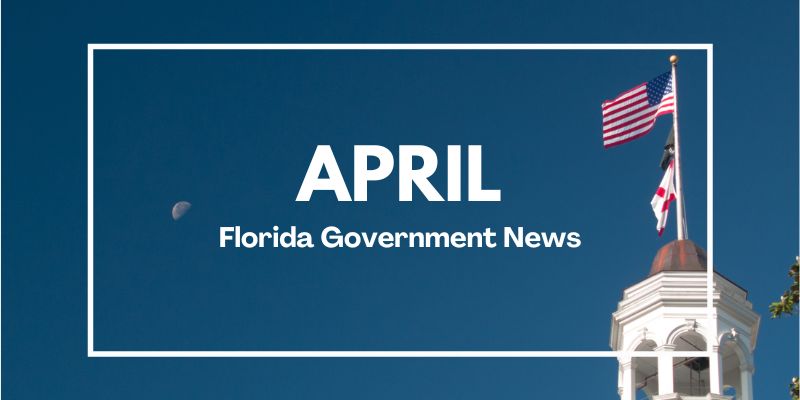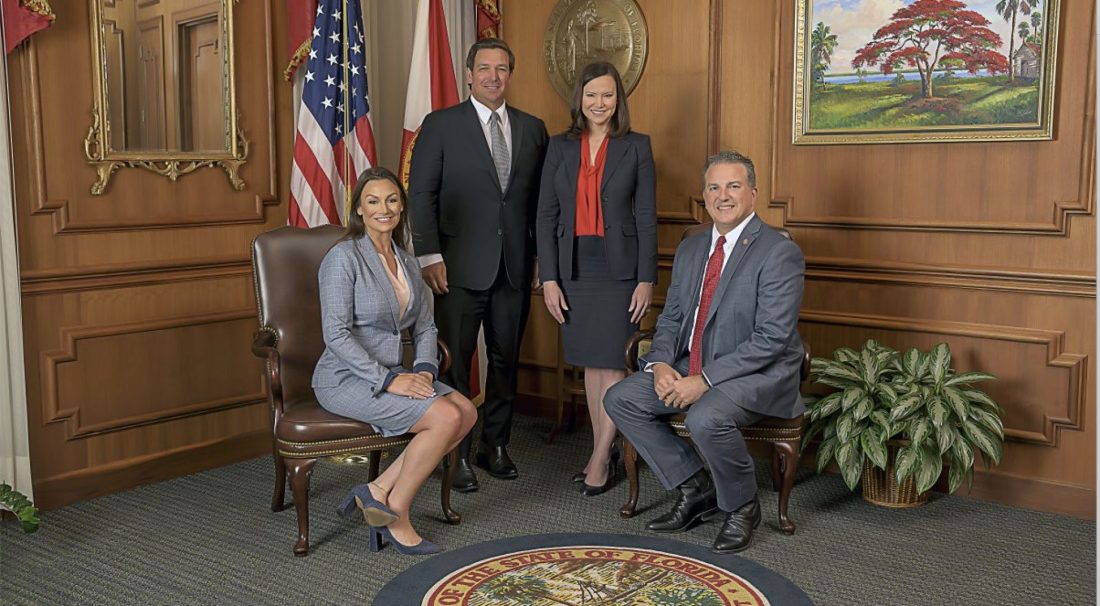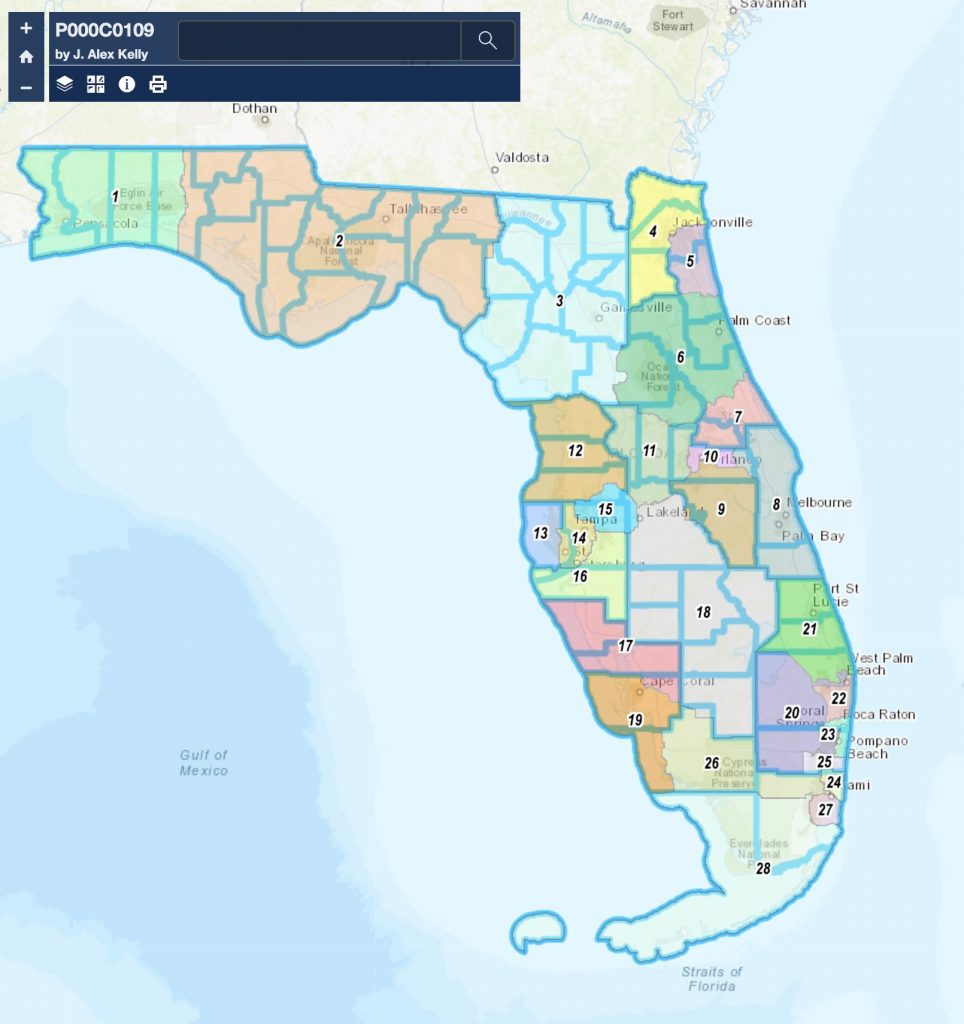
The Legislative Branch
The Florida Legislature is made up of a 40-member State Senate and a 120-member State House.
Find your representatives
The Special Session of the Legislature
Redistricting
Previously, I reviewed the Legislature’s progress on the redrawing of Florida’s state legislative and congressional district maps based on the 2020 census. The governor does not have veto power over the legislative maps, so what the two chambers agreed to is now law. But Gov. Ron DeSantis promised to veto the congressional map when it reached his desk. (Sparker’s Soapbox, 4/10/22)
He followed through with that promise and called the legislature back for a special session “to produce a new map that will establish lawful congressional voting districts in Florida.” (News Release, 3/29/22)
On Apr. 19, the Legislature convened and approved, over the vigorous protest of the chambers’ Black representatives, a map (P000C019) drawn by DeSantis. The map adds as many as four Republican seats in Florida, at the expense of Black voters in at least two of Florida’s congressional districts. The Florida delegation will be split between 20 Republicans and 8 Democrats. (Orlando Sentinel, 4/14/22)
Common Cause Florida and FairDistricts Now had filed a lawsuit in federal court in March challenging the legislature’s previously-approved map. On Apr. 29, they amended the suit considering the changed circumstances and were joined in it by the NAACP. But while the case file remains open, there is no way federal courts will replace Florida’s congressional map ahead of the 2022 elections. (Florida Politics, 5/3/22)
Meanwhile, the League of Women Voters of Florida joined minority advocacy groups in a lawsuit in state court challenging the most recently approved map. The case will be funded by the National Redistricting Foundation, a group led by former U.S. Attorney General Eric Holder. (Florida Politics, 4/22/22; LWVF News Release, 4/22/22)
Taking on Disney

Just as the special session was getting underway, DeSantis expanded its scope so that lawmakers “also will be considering termination of all special districts that were enacted in Florida prior to 1968.” The move was widely seen as intended to punish Disney for its CEO’s speaking out against the legislation formally known as the Parental Rights in Education Act but derided by critics as the “Don’t Say Gay” bill (HB 1557). (Tallahassee Democrat via Naples Daily News, 4/19/22)
Disney’s special district was created in 1967 and is known as the Reedy Creek Improvement District. It exempts Disney from a host of regulations and certain taxes and fees and is said to save Disney tens of millions of dollars a year. (Wall Street Journal, 4/20/22)
DeSantis signed the “Independent Special Districts” bill into law on Apr. 22. Some legal experts say it could run afoul of the First Amendment. (Miami Herald, 4/23/22)
But Florida faces a more immediate obstacle as a result of the new law. According to Disney, the state can’t dissolve the special district without paying off its massive debts. And a handful of Florida residents are suing the state and DeSantis in federal court, saying they violated legal obligations forbidding it from dissolving the district without resolving its outstanding debt. They say the move will saddle them with the company’s $1-billion debt burden. (Fortune, 4/28/22; Los Angeles Times, 5/4/22)
This is a developing story. Stay tuned.
The Executive Branch
Florida residents are represented in the Executive Branch of state government by an elected Governor, Attorney General, Chief Financial Officer, and Commissioner of Agriculture.
Meet the Executive Branch

DeSantis Calls Another Special Session
On Apr. 26, DeSantis called legislators back for a second special session, this time to address Florida’s failing property insurance market. That issue was left unresolved during the regular session earlier this year.
In the proclamation calling for the special session, DeSantis wrote that it is necessary to stabilize the insurance market ahead of hurricane season. He also cited various problems with the market, including high rates of litigation that drive up premiums and insurance companies recently becoming insolvent. The session is to be held May 23-27. (Associated Press via News4Jax.com, 4/27/22)
”Constitutional Carry”
In addition to addressing the property insurance market, DeSantis is being urged to expand the session to address another topic: “constitutional carry.” Under current law, people who want to carry guns must get concealed weapons licenses from the state Department of Agriculture and Consumer Services. Constitutional carry would allow people to carry guns without the licenses. (News Service of Florida via News4Jax.com, 5/4/22)
DeSantis promised a permitless carry gun law before he leaves the governor’s office, but said, “I can’t tell you exactly when.” (Tampa Bay Times, 4/29/22
Abortion
DeSantis is also being urged to rush through new abortion restrictions in the special session, in the wake of this week’s bombshell report that the U.S. Supreme Court may overturn abortion rights under Roe v. Wade. As of now, he does not seem eager to do so. (Tallahassee Democrat, 5/4/22)
DeSantis Signs Controversial Voting Bill
On Apr. 25, Gov. DeSantis signed SB 524: Election Administration “to ensure that Florida continues to have secure and accurate elections.” Among other things, the new law requires voter rolls to be annually reviewed and updated, strengthens voter ID requirements, establishes the Office of Election Crimes and Security to investigate election law violations, and increases penalties for violations of election laws. (News Release, 4/25/22)
Another change mandated by the new law requires that ballot drop boxes be referred to as “secure ballot intake stations.” All voter educational material that refers to drop boxes will need to be replaced, an unfunded mandate that will have to be funded by taxpayers locally. (Palm Beach Post, 4/27/22)
Acquiring Conservation Land
On Mar. 30, DeSantis and the Florida Cabinet approved 10 land and conservation easement acquisitions totaling more than 17,000 acres, the majority of which are within the Florida Wildlife Corridor. The land will be managed and monitored by the Florida Department of Environmental Protection (DEP), the Florida Fish and Wildlife Conservation Commission (FWC), or the Florida Department of Agriculture and Consumer Services (FDACS). (News Release, 3/30/22)
Vetoing “Net Metering”
On. Apr. 28, citing “steep increases in the prices of gas and groceries,” DeSantis vetoed a bill that would have allowed Florida electric utilities to impose steep fees on businesses and homeowners who install solar panels. (Miami Herald, 4/28/22; HB 741: Net Metering)
FDOE Rejects Math Textbooks
In its review of 132 math textbooks that were submitted for consideration, the Florida Department of Education (FDOE) rejected 54 of them. Reviewers of the books claimed the rejected texts contain ‘prohibited topics’ such as critical race theory, Common Core frameworks, and “the unsolicited addition of Social Emotional Learning (SEL) in mathematics.” (News Release, 4/15/22; News4Jax.com, 4/18/22)
As part of the official review process, the state assigned educators, parents, and other residents to review textbooks, in part to determine whether they adhered to Florida’s teaching standards for math. To explain its rejection of textbooks, the state released 6,000 pages of reviewer comments. (NYTimes, 5/7/22)
The FDOE since added 17 previously rejected math textbooks to its list of approved materials after publishers altered the books by removing “woke content,” according to a new disclaimer on the department’s webpage. (Florida Politics, 5/1/22)
A New Education Commissioner
In 1998, Florida voters amended the state constitution to make the state education commissioner an appointed post, abolishing what was then an independently elected cabinet position. (Tampa Bay Times, 5/7/22)
A seven-member Board of Education appointed by the governor appoints a Commissioner of Education to serve as the state’s chief educational officer with administrative authority of the FDOE.
On Mar. 10, Commissioner of Education Richard Corcoran announced that he would step down from the position at the end of April. (FDOE Press Release, 3/10/22)

On Apr. 29, the Board of Education unanimously appointed State Senator Manny Diaz, R-Hialeah, who DeSantis had recommended to succeed Corcoran in the post. (FDOE Press Release, 4/29/22)
In the state Senate, Diaz led the charge in expanding the charter school sector and school vouchers. He also sponsored legislation to increase teachers’ minimum salaries to $47,500 and to limit what can be taught about racism and other aspects of history in the public schools. (Miami Herald, 4/29/22)
In addition to serving in the Florida Senate, Diaz is Vice President for Finance for Doral College, a joint venture between Doral Academy Preparatory School, a charter high school in South Florida, and Academia, a for-profit education company. Critics have said his direct ties to the charter school industry while a state senator making education policy are a conflict of interest. (Miami Herald, 2/24/14)
Other Education news:
- New Board of Ed members show conservative bent. Florida Phoenix via Florida Politics, 3/31/22
- Faculty committee says UF cut corners, violated its rules in hiring surgeon general. Miami Herald, 3/31/22
- Florida teachers are among the worst paid in the US, even with budget surplus. WFLA
AG Moody’s $3 Billion Opioid Settlement
In March, Attorney General Ashley Moody secured more than $870 million for opioid abatement from CVS Health Corporation, CVS Pharmacy, Inc., Teva Pharmaceuticals Industries Ltd., and Allergan PLC. (News Release, 3/30/22)
In May, Moody secured more than $680 million from Walgreens, concluding the state’s litigation to hold major opioid distributors, manufacturers, and pharmaceutical companies accountable for fueling the opioid crisis in the state.
In total, through Attorney General Moody’s actions, the state has secured more than $3 billion for remediation, with much of the funds secured from the 12 defendants in the case going to cities and counties to fund local abatement efforts. (News Release, 5/2/55)
Ongoing Litigation
Appealing court ruling on 2021 election law: On Apr. 7, Chief U.S. District Court Judge Mark Walker issued a 288-page ruling that lambasted the state’s election code changes in 2021 (SB 90: Elections) as tactics to suppress Black votes. The state immediately filed an appeal. (Florida Politics, 4/10/22; News Service of Florida via WUSF Public Media, 4/26/22)
On May 6, a federal appeals court panel temporarily blocked Walker’s ruling and reinstated the law pending the outcome of the appeal. The three judges on the panel were all appointed by former President Donald Trump. Their decision means that Senate Bill 90′s provisions will likely be in effect during the November election. (Tampa Bay Times, 5/6/22)
Challenging the CDC mask mandate: AG Moody is leading 20 other states in an action challenging the federal mask mandate on public transportation. (Press Release, 3/29/22)
Claiming improper immigration enforcement: Florida, Alabama, and Georgia say the Biden administration is not properly deporting undocumented immigrants who commit crimes. (News Service of Florida via CBS12, 4/4/22)
Challenging plan to end Trump-era Title 42 deportation policy: Moody and 20 other Attorney Generals are suing the Biden administration over the plan. (Florida Politics, 4/15/22)
COA Fried Proposes Clean Energy Rules
Commissioner of Agriculture Nikki Fried unveiled a proposed rule that would set the state’s first goals for transitioning toward cleaner energy sources. The proposal next faces 21 days of public comment. (News Release, 4/21/220)
The Judicial Branch
A Win for Big Tobacco

Siding with R.J. Reynolds Tobacco Co., the Florida Supreme Court said plaintiffs must show that smokers relied on misleading information from cigarette makers to prevail on the claims. In what dissenting Justice Jorge Labarga called a “fundamental shift,” the ruling likely will make things harder for many plaintiffs suing tobacco companies over smoking-related illnesses. (News Service of Florida via Tampa Bay Times, 3/17/22)
24-Hour Abortion Waiting Period
A Leon County Circuit Court judge gave the green light to a 24-hour waiting period for abortions in what advocates called yet another blow to reproductive rights in Florida. The 2015 law that created the waiting period, signed by Gov. Rick Scott, had been in limbo for seven years as its constitutionality was debated in the courts. (Orlando Sentinel, 4/12/22)
That’s it for my State News Recap for April. I have made the difficult decision to put my monthly Sparker’s Soapbox recaps on hold for the coming months so I can focus on the upcoming August elections. I plan to research the candidates running for the federal, state, and (most) local offices that will be on Collier voters’ ballots, and share what I learn with you. Stay tuned!

